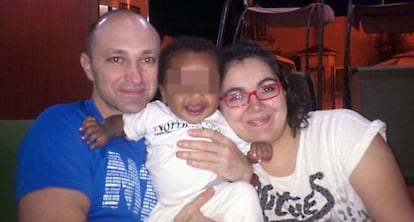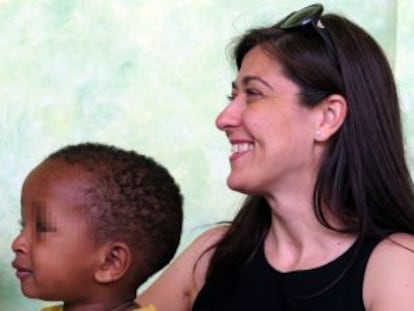Ethiopia closes the door on Spanish adoptive parents
After five months in Addis Ababa, two couples told to head home without their adopted sons

Two Spanish couples who have been in Ethiopia for five months waiting for the authorities there to clear up administrative problems over the adoption of two young boys now look set to return home without them.
Sonia Alonso and Rubén Fernández and Silvia Pons and Jerónimo Moltó began the adoption process four years ago, and travelled to the Ethiopian capital of Addis Ababa at the end of March, believing that all the paperwork had been approved and that failing a few formalities, they would be able to bring the two boys, aged 15 months and three years, back with them within days.
But the Ethiopian authorities say that a signature on one of the documents issued by the state-run orphanage where the children were living was forged, and that the whole adoption process must be repeated.
The couples have been looking after the two boys over the last five months, but last week they were obliged by a court to hand them back to the Ethiopian authorities.
“It was the worst moment of my life, a nightmare that we can’t go through again. We had to return to our hotel rooms that were filled with the babies’ things,” said Sonia Alonso.

The couples were legally assigned the children by a court soon after they arrived in Addis Ababa, and were told that their boys’ passports and birth certificates would be given to them within days. But a month later, the Ministry of Women’s Affairs, which handles adoption procedures, told the two couples that it was revoking the adoptions, saying that the matter was now in the hands of the regional governments in the south of the country were the two boys were from. It also said that a signature had been forged on one of the documents.
A Spanish-based agency that has helped with the adoption process says the authorities have been stalling for time and that the Ethiopian government now wants to put a stop to international adoptions, following pressure from regional governments that are opposed to it.
The Spanish Foreign Ministry initially said the matter was out of its hands, but last week contacted the Ethiopian authorities over the issue. Since then, Foreign Minister José Manuel García-Margallo has said there is nothing more to be done, suggesting that the couples begin new adoption proceedings. Both couples have said they will appeal against the court’s decision.
The Spanish Health Ministry reports a sharp decline in the number of overseas adoptions in Spain, which are down 61 percent on 2009, when 3,006 children were adopted by Spanish families: in 2013, the figure was just 1,188. China and Russia, from where the majority of children came, have toughened requirements for overseas adoptions, particularly in the case of same-sex couples and single parents.
Spain’s adoption requirements
- Regional governments issue adoption papers. Prospective adoptive parents must attend a series of workshops with other families to establish that they understand the risks and responsibilities involved.
- Once the couple has decided on the country they wish to adopt from, the regional government prepares a report based on assessments by social workers and psychologists who have visited the prospective parents at home.
- The regional government then issues the couple with a certificate validating them, which then contacts an ECAI, or international adoption collaborating entity. This process can take up to a year. There are sometimes waiting lists of up to three years, depending on the country.
- The country to which the family has applied then assigns a child, and the adoptees agree in writing to accept the child. Depending on the rules in each case, the prospective parents then travel to the country, or name a local representative to fill in the paperwork on their behalf.
- But the adoptive parents must be present at the final hearing in which a judge makes the adoption official. Once this has taken place, the country of origin issues the child with a passport and a birth certificate.
Tu suscripción se está usando en otro dispositivo
¿Quieres añadir otro usuario a tu suscripción?
Si continúas leyendo en este dispositivo, no se podrá leer en el otro.
FlechaTu suscripción se está usando en otro dispositivo y solo puedes acceder a EL PAÍS desde un dispositivo a la vez.
Si quieres compartir tu cuenta, cambia tu suscripción a la modalidad Premium, así podrás añadir otro usuario. Cada uno accederá con su propia cuenta de email, lo que os permitirá personalizar vuestra experiencia en EL PAÍS.
¿Tienes una suscripción de empresa? Accede aquí para contratar más cuentas.
En el caso de no saber quién está usando tu cuenta, te recomendamos cambiar tu contraseña aquí.
Si decides continuar compartiendo tu cuenta, este mensaje se mostrará en tu dispositivo y en el de la otra persona que está usando tu cuenta de forma indefinida, afectando a tu experiencia de lectura. Puedes consultar aquí los términos y condiciones de la suscripción digital.








































